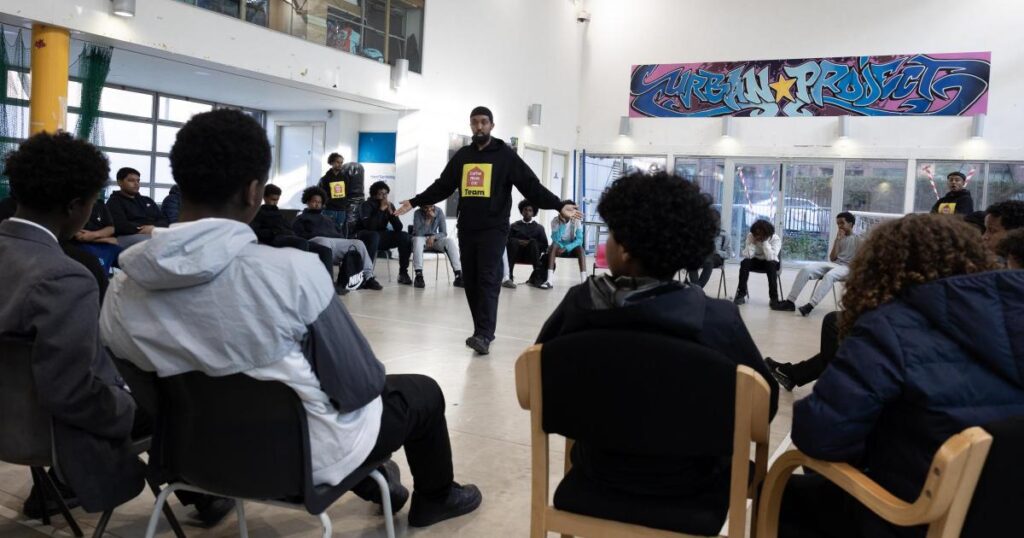“I want you to sit down if you’ve ever been stopped and search,” he tells the room. Everyone looks around but the group remains standing, so Khaleel asks his next statement.
“I want you to take a seat if anyone you know personally has been stopped and search”. The room is met with a sudden whoosh of movement as all of the boys go to sit down.
“That’s the whole room right there, that’s very powerful,” Khaleel says.
“You all know someone that’s been stopped and search, wow. That’s why I want to make sure you guys know your rights, we didn’t even get into the next topic regarding stop and search tactics, but I want you to make sure that you know your rights as well.”
The boys, who are aged between 11 and 17, are attending a youth hub which is part of Coffee Afrik CIC, in Hackney.
Children playing football (Image: Facundo Arrizabalaga/MyLondon) The service launched at the end of 2021 and is based at the Attlee Community Centre in Brick Lane where on Friday and Saturday evenings, it opens its doors to young people who come and take part in stop and search workshops led by a trauma-informed practitioner. There are also economics seminars.
The latter half of the evening is spent playing a classic game of football, followed by a shared meal.
Khaleel told the Local Democracy Reporting Service (LDRS): “People travel from as far as west London, one of the boys attending the youth hub mentioned it to a family visiting from Kent, so some young boys have come from Kent.
So we’re now seeing a few people outside of London joining these sessions, we also have tourists who see the sessions and aren’t even residents of the country, they will see the sessions for the young people and they will let their kids join in.”
Khaleel said the hub provides employment opportunities for attendees.

“He started in that role when we first started the youth hub and last year he was a youth intern – now he’s just finishing Year 13, he’s turned 18 and he’s become a youth worker.”
Coffee Afrik’s founder, Abdirahim Hassan, told the LDRS the hub is the busiest and most engaged Black-led youth service in Tower Hamlets, and is seeing up to 300 young people take part in the sessions each week.
Khaleel said: “We try to stay as inclusive as possible, we don’t see any difference between our young people. We’re all raised in the same community, we’re all facing the same issues, a lot of these young kids go to school together and they will see each other’s faces regularly.
“It’s not just a Somali youth hub, it’s a youth hub for all of our young people in Tower Hamlets and extended to many neighbouring boroughs as well.
“We’re just trying to make sure our young people stay aware, educated, informed and we support their development in any regard.”
Coffee Afrik’s work and close connection with Tower Hamlets’ young people has gone on to inspire the findings of a recent ground-breaking report which looked into the experience of over 100 Black and Asian boys in the borough, many of whom are part of the youth hub.
The report, which was published in April, was funded by the Mayor of London’s Violence Reduction Unit (VRU) and was co-produced by Coffee Afrik, the Aberfeldy Project CIC and Dahaba Ali Hussen.
The report found 98.8per cent of survey respondents had reported experiences of either emotional, physical or verbal violence, while 65.6per cent felt violence was a pressing issue within their community.
The apparent anomaly in the percentages being split are down to one or more respondents not fully answering all questions.
It also looked into policing, educational policies, economic deprivation and the impact this is having on boys in the borough, and concluded that all of these contribute to the cycles of harm and disadvantage experienced by young people in Tower Hamlets.
Khaleel and Abdirahim told the LDRS the report is calling for a fundamental change and radical restructure within policy and public health, which they believe would help stop the same cycles from happening and will create better pathways for young people.
Khaleel said: “If this is what they are experiencing and this is what they are feeling, then a lot needs to change. There’s a lot of violence and there’s a lot of inequality they’re seeing around their environment and I feel like this will harm them and their development if they’re not given the support that they need.”
Coffee Afrik plans to present the report in Parliament while the creation of a youth hub exclusively for girls is also on the cards.
Abdirahim said: “I passionately believe in devolving power, empowering people and handing spaces and projects back to community with reimagined governance and long-term support.
“It’s important that leaders in the third sector let go of ego and genuinely empower communities through the lens of liberation.”




